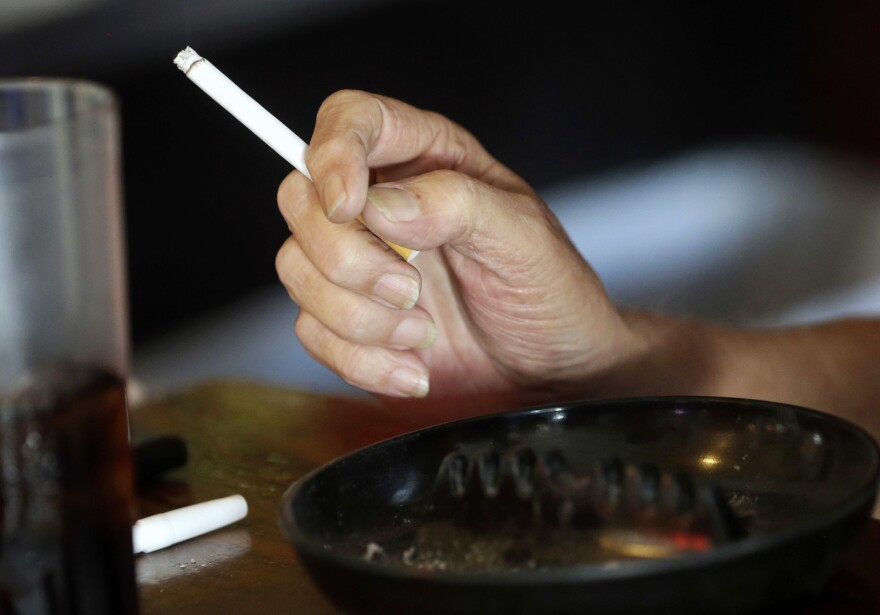A state appeals court Wednesday said a man could not collect millions of dollars from tobacco companies in the death of his husband because they were not married when a smoking-related illness began in the 1990s — a time when Florida law prevented them from being married.
A panel of the 4th District Court of Appeal rejected a Broward County jury’s decision to award $9 million to Bryan Rintoul for loss of consortium and pain and suffering in the death of Edward Caprio. That was part of a broader ruling by the panel to reject a $157 million judgment against Philip Morris USA and R.J. Reynolds Tobacco Co. and order a new trial.
Caprio, who started smoking at age 15 and was diagnosed with chronic-obstructive pulmonary disease in 1996, filed the lawsuit in 2007. It was one of thousands of cases known as “Engle progeny” cases against tobacco companies. Plaintiffs in those types of cases must show that illnesses had “manifested” by November 1996.
Rintoul and Caprio were in a relationship starting in 1982 and were married after same-sex marriage became legal in Florida in 2015, according to Wednesday’s ruling. Caprio, however, died in 2018 with the lawsuit still unresolved.
Ater Caprio’s death, Rintoul sought to add himself as a plaintiff and pursue a wrongful-death claim as a surviving spouse. A circuit judge allowed Rintoul to pursue the claim for what are known as non-economic damages.
But the appeals-court panel Wednesday said Florida law blocks the claim because Rintoul and Caprio were not married when the illness manifested — even though they could not be legally married at the time. The ruling said “our jurisprudence provides that if one spouse was injured before marriage, the other spouse has no right to recover damages for loss of consortium pertaining to that injury.”
“In sum, the lower court in this case agreed to let a jury reach back in time and establish a same-sex marriage even though Florida did not recognize then, or now, common law marriage,” said the opinion, fully shared by Judges Spencer Levine and Mark Klingensmith. “Rintoul asks this court to affirm the establishment of a ‘common law’ marriage. However, juries cannot create marriages in Florida, and courts cannot recognize one where none existed. Though Rintoul attempts to frame the couple’s relationship as ‘just like a marriage,’ the fact remains undisputed that they were not married under Florida law until 2015.”
Levine, in a concurring opinion, said the Legislature would have to change state law to allow such claims.
“No matter how sympathetic we are to appellee’s (Rintoul’s) argument, we cannot create or effectively ‘legislate’ an exception to well-established law,” Levine wrote. “We cannot judicially ‘backdate’ a marriage to allow appellee to proceed with his claim.”
Levine wrote that legislatures in such states as Delaware, Illinois and Washington have created processes to “backdate” marriages for pre-existing domestic partnerships and civil unions. Other states have “merged” civil unions into marriages, he said.
“In any event, it was the legislature in each state that made the decision of what pre-existing domestic partnerships or civil unions would be merged into marriages and whether the marriages would be ‘backdated’ or not,” Levine wrote. “Absent such action from the Florida Legislature to create an exception for same-sex couples prohibited from marrying prior to the decedent’s injury, appellee is without redress.”
The South Florida appeals court also rejected the overall judgment for reasons unrelated to the marriage issue. One of those issues involved the circuit judge allowing evidence about the electronic-cigarette company JUUL Labs into the trial.
Philip Morris’ parent company, Altria Group, Inc., held a large stake in JUUL Labs, and plaintiffs’ attorneys sought to use evidence about an “adolescent addiction industry” as they pursued punitive damages, according to Wednesday’s ruling.
Most of the judgment was made up of punitive damages. But the appeals court said the JUUL evidence should not have been admitted into the trial.
“(The) specific conduct which led to Caprio’s death was his addiction to tobacco cigarettes and not e-cigarettes,” the ruling said. “While the nicotine in cigarettes causes an addiction, it is the smoking of the tobacco which results in the terrible diseases its participants can experience. … E-cigarettes do not involve smoking tobacco, which was the cause of Caprio’s disease. Therefore, the harm caused by the tobacco is entirely dissimilar to the JUUL e-cigarettes.”
Engle progeny cases stem from a 2006 Florida Supreme Court ruling that was an outgrowth of an unsuccessful class-action lawsuit. The ruling established critical findings about issues such as the dangers of smoking and misrepresentation by cigarette makers. It also provided a window for individual class members to file lawsuits against tobacco companies and allowed them to use the findings in those cases.
Judge Martha Warner concurred in part of Wednesday’s ruling and dissented in part.
9(MDAyNDY5ODMwMDEyMjg3NjMzMTE1ZjE2MA001))
Copyright 2022 Health News Florida



